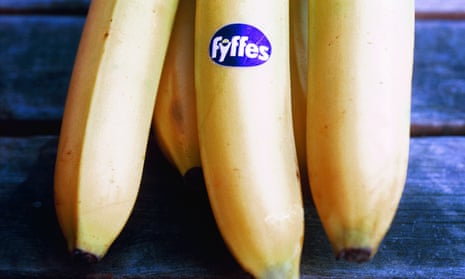The Dublin-based banana company Fyffes has been accused of having “no respect” for workers’ rights, amid allegations that staff on Central American fruit plantations are being serially mistreated.
The GMB trade union called for Fyffes to be thrown out of the Ethical Trade Initiative, which promotes labour rights, over reports of abuses by subsidiaries in Costa Rica and Honduras.
In one case, 14 workers on a melon plantation, which is 60%-owned by Fyffes’ subsidiary Suragroh were allegedly hospitalised after being poisoned by noxious chemicals.
The GMB said the female workers had not been given safety gear to protect them while handling fruit. It said workers had also reported that they were not being paid the minimum wage, were denied extra pay for overtime and Sundays and were not given public holidays.
The GMB, which received the allegations from local trade union partners, said workers were also illegally charged for transport to the fields where they work.
When they tried to form a trade union branch in January 2016, the GMB said, four members were abducted, threatened and held for 24 hours until they renounced membership.
In Costa Rica, Fyffes’ Anexco pineapple subsidiary was accused of running “a purge” of union members, which led to 12 workers taking the company to court.
GMB’s international officer Bert Schouwenburg, said: “Fyffes is an appalling employer that cares nothing for its workers who toil in boiling heat to produce the fruit that makes the company’s profit.
“They have no respect for domestic or international law governing workers’ rights and must be brought to book.”
The GMB called for Fyffes, the world’s fourth-largest banana importer, to be immediately expelled from the ETI, an organisation of companies, NGOs and unions backed by UK taxpayers.
Fyffes, which has been importing bananas to the UK and Ireland since the 1880s, declined to comment on the allegations, which are as yet unsubstantiated.
The Irish firm is part of the Ethical Trade Initiative (ETI), whose members sign up to a code that includes rules about how they treat workers.
The ETI’s website says it “reserves the right to terminate membership in cases where companies are in breach of ETI membership obligations”.
Peter McAllister, the ETI’s executive director said: “We take all allegations very seriously. When issues are raised and there are local processes in place such as mediation and negotiation agreements, members are expected to work together and use those processes to get resolution.
“We understand that there are local processes in place in this case.”
He said the ETI could investigate if the matter could not be resolved locally between Fyffes and unions, and a complaint was raised by one of its members.
Banana Link, an ETI member and NGO that advocates for fruit workers’ rights, said: “We absolutely hear the frustration from unions on the ground. We’re keen to engage in dialogue with Fyffes in the hope that they’ll speak to unions on the ground.”
Banana Link claims that only 4p in every £1 spent on Costa Rican pineapples in the UK goes to workers.
Fyffes’ website says the company “has a responsible attitude towards the environment, our growers, our customers and the consumer and we’re proud of our corporate social responsibility and sustainability profiles
“Fyffes prefers to work with people at source in order to maximise the benefit, evaluating the success of our participation in terms of observable results rather than potential media advantage.”
